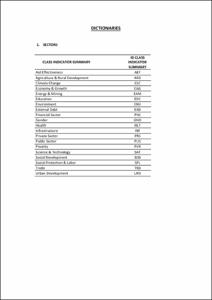Mostra el registre d'ítem simple
Data analysis of socio-economic and financial factors from a public world-wide source
| dc.contributor | Arias Vicente, Marta |
| dc.contributor.author | Calvo Fantova, Santiago |
| dc.contributor.other | Universitat Politècnica de Catalunya. Departament de Ciències de la Computació |
| dc.date.accessioned | 2020-07-01T08:31:44Z |
| dc.date.available | 2020-07-01T08:31:44Z |
| dc.date.issued | 2020-01-27 |
| dc.identifier.uri | http://hdl.handle.net/2117/192080 |
| dc.description.abstract | Many socio-economic studies are nowadays trying to accomplish a complete description of how the different elements of our society and world are connected. This work is an attempt to build an architecture that provides an explanation of the connections and impacts that exist among the different indicators (for now on also mentioned as sectors) of a state or population (Agriculture, Climate Change, Economy & Growth, Energy & Mining, Education, Health, Poverty, Science & Technology, Social Development, and others). We will focus our effort in the research of, not only the correlations that may exist between these indicators and thought the different countries analyzed, but also the causality that relates them. With causality (we will deploy a Bayesian Network architecture for each country to accomplish this task), we will be able to describe the impact and influence that one indicator may have in the others. This could lead to an accurate, powerful and global knowledge of the functioning of our world and each single country in particular, along with a vision of the dependencies between the different indicators that describe a country. Finally, we will also propose a clustering model where each individual will be a representation of the Bayesian Network obtained for each country. With this model, we will provide N aggrupation of countries with their Bayesian Network representation for each one, which will give us a global vision of the functioning of our world represented by the causal relationships between the different indicators that can be found in our countries or populations |
| dc.language.iso | eng |
| dc.publisher | Universitat Politécnica de Catalunya |
| dc.publisher | Universitat Politècnica de Catalunya |
| dc.subject | Àrees temàtiques de la UPC::Informàtica |
| dc.subject.lcsh | Neural networks (Computer science) |
| dc.subject.other | Data Analysis |
| dc.subject.other | PCA |
| dc.subject.other | Autoencoder |
| dc.subject.other | Neural Networks |
| dc.subject.other | Bayesian Networks |
| dc.subject.other | Causality |
| dc.subject.other | Country Indicators |
| dc.subject.other | Socio-Economic factors |
| dc.subject.other | Correlation |
| dc.subject.other | Directed Acyclic Graph |
| dc.subject.other | Clustering. |
| dc.subject.other | Data Analysis |
| dc.subject.other | PCA |
| dc.subject.other | Autoencoder |
| dc.subject.other | Neural Networks |
| dc.subject.other | Bayesian Networks |
| dc.subject.other | Causality |
| dc.subject.other | Country Indicators |
| dc.subject.other | Socio-Economic factors |
| dc.subject.other | Correlation |
| dc.subject.other | Directed Acyclic Graph |
| dc.subject.other | Clustering. |
| dc.title | Data analysis of socio-economic and financial factors from a public world-wide source |
| dc.type | Master thesis |
| dc.subject.lemac | Xarxes neuronals (Informàtica) |
| dc.subject.lemac | Anàlisi de dades |
| dc.identifier.slug | 147843 |
| dc.rights.access | Open Access |
| dc.date.updated | 2020-06-09T04:00:48Z |
| dc.audience.educationlevel | Màster |
| dc.audience.mediator | Facultat d'Informàtica de Barcelona |
| dc.audience.degree | MÀSTER UNIVERSITARI EN INNOVACIÓ I RECERCA EN INFORMÀTICA (Pla 2012) |



